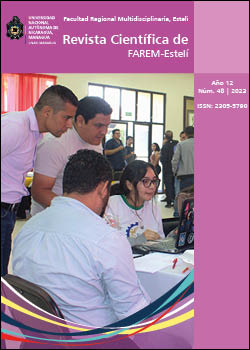Motivación y desempeño laboral de los colaboradores de la entidad financiera: Caja Arequipa, Perú
DOI:
https://doi.org/10.5377/farem.v12i48.17511Palabras clave:
Motivación laboral, desempeño laboral, colaboradores, comunicación efectiva, productividadResumen
La motivación laboral juega un papel fundamental en el desempeño de los colaboradores en cualquier organización. El objetivo de la investigación es determinar la relación entre la motivación y el desempeño laboral en los colaboradores de la Caja Arequipa - Perú. La población estuvo determinada por un total de 15 colaboradores de la agencia, al ser una población pequeña, no se consideró tener un tamaño de muestra. Se utilizó un formulario de Google y para su difusión el grupo de WhatsApp de la entidad. Se analizó la información utilizando el SPSS versión 26. La investigación es cuantitativa de tipo correlacional. Comprende dos variables: motivación y desempeño laboral. Se utilizó un cuestionario con 15 elementos implementados por medio de la escala de Likert tipo cinco, la validación del instrumento se realizó, por dos vías, por juicio de tres expertos del rubro financiero y el Alfa de Cronbach (0.794), y un coeficiente de correlación de Spearman de 0.798. El tiempo de ejecución del estudio fue de cinco meses (2023). De igual manera, se utilizó un Baremo de interpretación, cuyos resultados mostraron que los colaboradores estaban moderadamente satisfechos con el salario percibido, y tienen un alto nivel de compromiso para lograr metas y asumir nuevos desafíos. En cuanto al desempeño laboral, los colaboradores se mostraron muy satisfechos con el clima organizacional y las relaciones con colegas y clientes. Como conclusión, el estudio encuentra una alta conexión entre la motivación y el desempeño laboral destacando la importancia de la comunicación efectiva, las buenas relaciones con los clientes y el apoyo de los supervisores para el compromiso y la productividad de los colaboradores.
Descargas
Citas
Avendaño Mamani, Y., & Cáceres López, J. (2019). Desempeño laboral: una revisión teórica.
Caballero Rodríguez, K. (2002). El concepto de “satisfacción en el trabajo” y su proyección en la enseñanza.
Carmona Lavado, A., & Leal Millán, A. (1998). La teoría de los dos factores en la satisfacción del cliente. Investigaciones Europeas de Dirección y Economía de La Empresa, 4(1), 53–80.
Chang Yui, A. L. (2010). Estudio de la motivación laboral y el conocimiento de la necesidad predominante según la teoría de las.
Chiavenato, I. (2007). Administración de recursos humanos. El capital humano de las organizaciones.
Cristóbal Quispe, G. Y. (2018). Caracterización la gestión de la calidad bajo el enfoque de la comunicación interpersonal en la fuerza de venta en las micro y pequeñas empresas del sector comercio-rubro venta al por menor de productos textiles, prendas de vestir, calzado y artículos de cuero, en el distrito de Huaraz, 2015.
Cronbach, L. J. (1947). Test”Realiability”: It’s meaning and determination. In Psychometrika (Vol. 12, Issue 1).
González Serra, D. J. (2008). Psicología de la motivación.
Lope Diaz, L. H., Reyna Palomo, C., & Hernández Iruegas, F. X. (2013). Recursos humanos: La importancia de la motivación e incentivos para los trabajadores.
Marruego Marruego, M. M., & Perez Melendez, B. P. (2012). Análisis de la teoría de las expectativas de Victor Vroom.
Molina, H. (2000). Establecimiento de metas, comportamiento y desempeño. Estudios Gerenciales, 75, 23–33.
Montejo Pérez, A. (2001). Evaluación del Desempeño Laboral. Charles-Henri, 2, 222.
Moreno Guillen, R. A. (2017). Líneas Estratégicas de Comunicación en el Desarrollo de Habilidades Gerenciales y Humanas. Revista Scientific, 2(Ed. Esp.), 376–393. https://doi.org/10.29394/scientific.issn.2542-2987.2017.0.0.20.376-393
Noguera Delgado, Á. M. (2015). Los estilos de enseñanza de la Educación Física y el Deporte a través de 40 años de vida profesional Teaching styles of Physical Education and Sport through 40 years of professional life. In Retos (Vol. 28). www.retos.org
Pertúz, F. (2018). Liderazgo Transformacional en Empresas Sociales Desde la perspectiva Ética de la Responsabilidad Social Empresarial. https://www.redalyc.org/articulo.oa?id=99356889009
Quintero Angarita, J. R. (2011). Teoría de las necesidades de Maslow. http://paradigmaseducativosuft.blogspot.com/
Rocco, L., & Oliari, N. (2007). La encuesta mediante internet como alternativa metodológica.
Publicado
Número
Sección
Licencia
Derechos de autor 2024 Revista Científica de FAREM-Estelí

Esta obra está bajo una licencia internacional Creative Commons Atribución-NoComercial-CompartirIgual 4.0.



